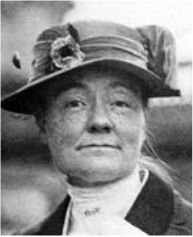
Jane Bowne Haines
July 18, 1869 – September 21, 1937Jane Bowne Haines was born on July 18, 1869 into an old Philadelphia Quaker family. The family’s interest in horticulture dates back to her ancestor Caspar Wistar, who was a professor at the University of Pennsylvania and an amateur botanist.
Jane grew up on a 100 acre estate in Cheltenham, just on the on the outskirts of Philadelphia. On this 100 acre estate, Jane’s father had established a fruit and shade-tree nursery that intrigued Jane as a child. Jane began to learn the fundamentals of horticulture in a formal garden located in Wyck, a Germantown home that had been in the family since the early 1700s. There she would study plants in the formal garden that was first created by Caspar Wistar Haines in 1790. The garden was aromatic and rich in growth, giving life to flowering trees, roses, grape arbors, fruit orchards and ornamental shrubs. It was also where Jane found her happiness and inspiration.
Jane received her education at Bryn Mawr and the Library School in Albany New York. She worked at the Library of Congress for a couple of years but returned home to assist in running the family nursery. It was here when she plunged herself in the beginnings of her career in horticulture.
Jane became a founder of the Garden Club of Philadelphia, and made it her goal to establish a school of practical horticulture for women in the Philadelphia area. To help her complete this goal, Jane and her associates traveled to Europe and visited several gardening schools. When she arrived back to Philadelphia, her and her associates purchased a 71 acre farm near Ambler, Pennsylvania, where the school would be built in 1910. It was named the Pennsylvania School of Horticulture for Women and was modeled after two horticultural colleges they visited in England.
The first class of Jane’s school was held in a farmhouse on February 11, 1911. Haines’ school had a “learn-by-doing” philosophy where students would study in the classroom then apply their knowledge in the schools garden and orchard. Her school received limited funding, and never educated more than a few hundred students. However, the school had a significant impact on the history of horticulture. In the 1920s, teachers and students began publishing Farmers Digest, a monthly journal that summarized more than 200 technical bulletins and articles on agriculture and horticulture.
In 1958, the school merged with Temple University’s Ambler Junior College for financial reasons, and men were admitted to the program for the first time. The school is still a part of Temple Ambler today, carrying on the spirit and the work preserved by the Pennsylvania School of Horticulture for Women.
